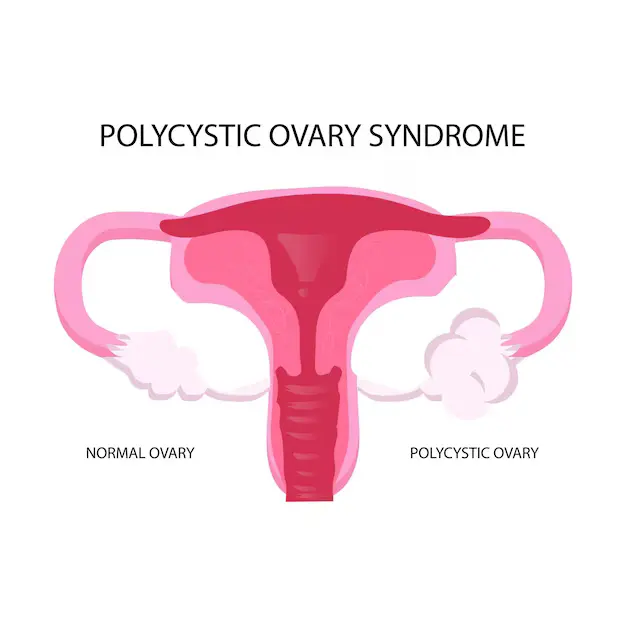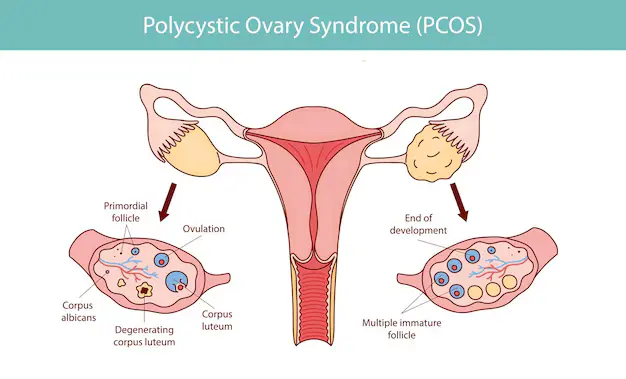Polycystic Ovary Syndrome (PCOS) is a condition that affects many women. It happens when a woman’s ovaries produce too many male hormones, and it can cause issues like irregular periods, weight gain, and trouble getting pregnant. But don’t worry! PCOS can be managed with a healthy diet and lifestyle changes. In this blog, we will talk about how making small changes to what you eat and how you live can help you feel better and manage PCOS.
Table of Content:
What is PCOS?
Before we dive into how to manage PCOS, let’s first understand what it is. Polycystic Ovarian Syndrome is a condition that happens in the ovaries, where small cysts (fluid-filled sacs) form. These cysts stop the ovaries from releasing eggs the way they should. This can lead to irregular periods, acne, hair growth, and difficulty getting pregnant. However, managing Polycystic Ovarian Syndrome with the right diet and lifestyle changes can make a big difference in how you feel.
The Importance of a Healthy PCOS Diet
A PCOS diet plays a big role in managing the condition. Eating the right foods can help with weight management, hormone balance, and reducing Pcos symptoms like acne or excessive hair growth. Here’s how to make sure your diet is PCOS-friendly:

Choose Low Glycemic Index (GI) Foods:
- The glycemic index (GI) measures how fast foods raise blood sugar levels. Foods with a high GI can cause a spike in blood sugar, which isn’t great for women with Polycystic Ovarian Syndrome.
- Examples of Low GI Foods: Whole grains (like quinoa, brown rice, oats), non-starchy vegetables (like spinach, kale, broccoli), and fruits (like apples, berries, and oranges).
- Why it helps: Low GI foods help control insulin levels, which can be higher in women with Polycystic Ovarian Syndrome.
Eat More Fiber:
- Fiber is important because it helps control blood sugar and insulin levels. It also helps keep you full, which can help with weight management.
- Foods high in fiber: Beans, lentils, vegetables, fruits, and whole grains.
- Why it helps: Fiber helps manage the spikes in blood sugar that often happen with Polycystic Ovarian Syndrome.
Include Healthy Fats:
- Healthy fats can help reduce inflammation and keep hormones balanced.
- Examples of healthy fats: Avocados, olive oil, nuts, seeds, and fatty fish like salmon or mackerel.
- Why it helps: These fats are good for your body and can help with hormone production.
Avoid Processed Foods:
- Processed foods like chips, cookies, and fast food are high in sugar and unhealthy fats. These foods can lead to weight gain and make Polycystic Ovarian Syndrome symptoms worse.
- What to avoid: Sugary drinks, packaged snacks, and fried foods.
- Why it helps: Eating whole foods and avoiding processed options helps control blood sugar and weight.
How to Manage PCOS Through Exercise
Exercise is another important part of managing PCOS. It helps with weight control, reduces insulin resistance, and can improve mood. Here’s how to make exercise a regular part of your lifestyle:
Aim for Regular Physical Activity:
- Aim for at least 30 minutes of exercise, 5 days a week. You don’t need to do anything extreme. Simple activities like walking, cycling, or swimming can help.
- Why it helps: Exercise helps manage weight and improves insulin sensitivity.
Strength Training:
- Strength training exercises (like lifting weights) are also beneficial for Polycystic Ovarian Syndrome. It helps build muscle, which can increase metabolism and help control weight.
- Why it helps: Building muscle helps your body burn more calories even at rest.
Try Yoga and Stress-Relief Activities:
- Yoga, meditation, or deep breathing exercises can help reduce stress. Stress can make Polycystic Ovarian Syndrome symptoms worse, so managing stress is key.
- Why it helps: These activities help relax your body and mind, which can reduce symptoms like anxiety or mood swings.
Effective Strategies for Managing Weight with PCOS
Many women with Polycystic Ovarian Syndrome struggle with weight gain or have difficulty losing weight. Managing weight is important because it can improve insulin sensitivity and reduce the risk of developing other conditions, such as diabetes.
Focus on Portion Control:
- Even though you may be eating healthy foods, it’s important to watch portion sizes. Eating in moderation can help manage weight and control insulin levels.
- What to do: Use smaller plates, avoid second servings, and try to listen to your body’s hunger cues.
Balanced Meals:
- Eating balanced meals that include a mix of protein, healthy fats, and fiber can help you feel full and prevent overeating.
- What to include: A mix of lean protein (like chicken, tofu, or eggs), healthy fats (like avocado or olive oil), and fiber-rich carbs (like whole grains or vegetables).
Slow and Steady Weight Loss:
- Losing weight slowly and steadily (1-2 pounds per week) is the healthiest way to manage PCOS-related weight gain.
- Why it helps: Rapid weight loss can sometimes cause hormone imbalances, so slow weight loss is more sustainable and healthier.
The Role of Supplements for PCOS Treatment

Some women with PCOS may benefit from taking certain supplements. These can help improve hormone levels, reduce inflammation, and support overall health. Here are some common supplements that may help with PCOS:
a) Inositol:
- Inositol is a type of sugar that can improve insulin sensitivity and support hormone balance.
- Why it helps: It’s one of the most researched supplements for women with PCOS and can help regulate cycles.
b) Vitamin D:
- Many women with PCOS are low in vitamin D, which can affect insulin levels and reproductive health.
- Why it helps: Vitamin D supplements can help with hormone regulation and improve insulin sensitivity.
c) Omega-3 Fatty Acids:
- Omega-3s, found in fatty fish like salmon, chia seeds, or flaxseeds, can reduce inflammation and improve insulin resistance.
- Why it helps: Omega-3s help balance hormones and support overall health.
d) Magnesium:
- Magnesium can help manage stress, regulate blood sugar, and improve sleep quality.
- Why it helps: PCOS can cause issues with sleep, so magnesium helps calm the body and support healthy sleep patterns.
Balancing Hormones and Reducing Stress for Managing PCOS

Hormones are a big part of PCOS, and managing them is important for feeling better. Stress is one thing that can make hormones worse, so it’s important to find ways to relax and reduce stress.
a) Get Enough Sleep:
- Aim for 7-9 hours of sleep each night. Poor sleep can increase stress levels and mess with hormones.
- Why it helps: Getting enough sleep supports hormone balance and reduces stress.
b) Stress Management Techniques:
- Stress can increase the levels of the hormone cortisol, which can make PCOS symptoms worse. Finding ways to relax is important.
- What to try: Meditation, yoga, reading, or listening to music can help you unwind.
c) Stay Hydrated:
- Drinking enough water helps your body function properly and keeps your hormones balanced.
- How to stay hydrated: Try to drink at least 8 glasses of water a day. You can also drink herbal teas or water with lemon.
Consult with a Gynecologist Specialist
It’s always a good idea to talk to a healthcare provider, like a doctor or nutritionist, to get advice on managing PCOS. They can guide you in the right direction and help you create a plan that works for you.
a) Regular Check-ups:
- Regular check-ups can help track your health and monitor any changes in your condition.
- What to discuss: Talk about your symptoms, any changes in your period, or concerns about weight and hormone levels.
b) Consider Medication:
- Some women with PCOS may need medication to help balance hormones or regulate their menstrual cycles. Birth control pills, metformin, or anti-androgen drugs are commonly prescribed.
- Why it helps: Medications can help reduce PCOS symptoms like hair growth or irregular periods.
Conclusion
Managing PCOS may seem challenging at first, but with the right diet, exercise, and lifestyle changes, it’s possible to feel better and lead a healthy life. Focus on eating a balanced diet with whole, low GI foods, exercising regularly, and reducing stress. Supplements like inositol and vitamin D can help with hormone balance, and working with a healthcare professional can provide extra support. By making these changes, you can take control of PCOS and improve your quality of life. Remember, small changes add up over time. Stay patient with yourself and celebrate the progress you make each day.


